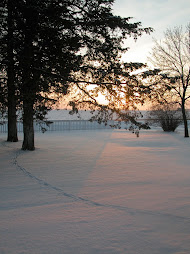“You love them and raise them up for eighteen years,This quote isn’t mine; it belongs to a seventy-year-old man for whom I’m helping to write a personal history. But the words resonate as I follow my son south on U.S. Hwy 169, both of our cars stuffed with the things a college-bound man feels he needs for survival. At mile marker seventy, I begin to weep.
then you drop them off at college and it just feels
like you put them in a ditch.”
I hadn’t felt like this earlier. I was feeling relief while I was vacuuming up the dirt left behind after he’d vacated his room. And for weeks I have been looking forward to no longer tripping over size ten sneakers strewn about the kitchen, no longer having to stock the cupboard with Doritos, Pop Tarts and Cinnamon Toast Crunch, no longer having to turn stinky, sweaty socks right side out before tossing them into the washer. Of course he needs to go to college, I tell myself; raising children right and then sending them out into the world is largely the point of parenting. I wouldn’t want him to not leave.
So the tears come with surprise. The drive had been going fine; I’d spent most of my miles pondering what poignant advice I might leave with my son once he gets settled. Words like responsibility, accountability and maturity were rolling around my brain when suddenly a picture of him at age two commandeers my thoughts. I watch him, all doe-eyed and darling, a curly-haired cream puff who pushes a kitchen chair toward the counter so he can help himself to the cookie jar. If I didn’t know better, I would swear the scene played out just yesterday. That’s when the tears begin – when one day he’s pushing a plastic lawnmower across the carpet and the next day he’s three car lengths in front of me, off to college. That’s when the tears begin – when I realize eighteen years of my life have vanished in the time it takes the sun to duck behind a cloud.
I compose myself.
In front of me, as he drives with a bent elbow jutting out the open car window, I consider what lies ahead for him. The road is wide open. He is eighteen and totally unencumbered. He can do whatever his imagination and courage will allow. He is pure potential – moving toward a blue horizon.
I had a glimpse of that horizon once too, but it was half a lifetime ago. The years he has on account are years I’ve already spent. The challenges he’ll face are ones I’ve mostly overcome. He’s embarking on a journey that will take him to unfamiliar places; it’s territory I’ve mostly covered and now know by heart.
As we approach the college bookstore where we’ll stop to load up on textbooks, notebooks, folders and pens, it suddenly occurs to me why I am so sad. It’s not so much because I’m going to miss him. It’s because I wish I was him.







